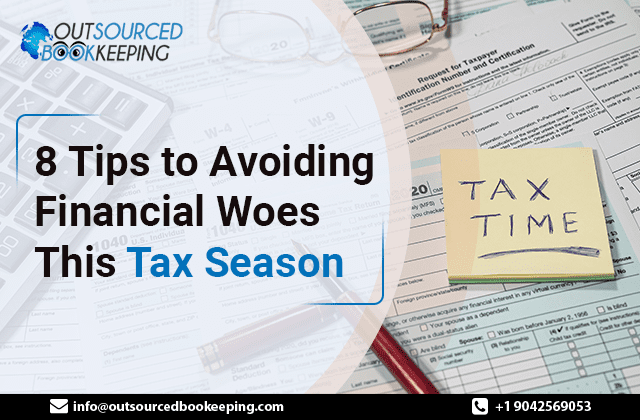Financial responsibilities may be confusing and important for both people and organizations to navigate as tax season draws near. Tax rules can be complicated, which might raise questions regarding prospective obligations, financial stability, and compliance.
Adopting sound financial strategies is essential to avoiding tax-related errors and ensuring a seamless, stress-free approach. A proactive strategy may greatly reduce tax problems, from careful record-keeping to proactive planning.
To ensure not just compliance but also financial resilience during this tax season, this guide provides eight vital ideas aimed at assisting people and companies in navigating the complexities of tax season.

1. Organize Documents Early
Getting your financial records organized early is essential to a hassle-free tax season. Start by compiling all necessary documentation, including investment statements, W-2 forms, income statements, receipts, and other pertinent tax-related paperwork. Sort them into categories like as credits, investments, income, and deductions.
Establishing a system will expedite the procedure and avoid the last-minute hurry. To retain digital copies of documents for convenient access and backup, think about using digital tools or software. Maintain an up-to-date inventory of the documentation needed for your particular tax situation. To verify correctness and completeness, go over the material and cross-reference it.
2. Seek Professional Guidance
Seeking expert advice may be quite helpful when handling complicated tax problems or if you’re unsure about tax rules and regulations. Tax specialists, such as tax consultants or certified public accountants (CPAs), have the knowledge and experience to go through complex tax rules and find possible credits or deductions that apply to your particular situation. They may offer insightful information on how to save taxes and support you in choosing the right deductions.
3. Keep Records Secure
It is essential to safeguard private financial information and papers about taxes. To protect physical papers, choose secure storage solutions like fireproof safes or encrypted digital files. To stop unwanted access, encrypt digital files and use strong password security.
Make frequent backups of your data using cloud-based storage services as well as hard backups to prevent data loss in the event of theft, system failure, or damage. Furthermore, exercise caution with phishing efforts or other fraudulent actions that try to get your financial information.
4. Stay Organized Year-round
Keeping things organized all year long makes tax season far less stressful. Make it a habit to routinely update and organize financial documents. As they happen, keep note of your earnings, outlays, investments, and receipts. Use accounting applications or software to keep track of transactions and instantly classify spending.
Maintaining a standard of organization makes it easier to locate the papers you need to do your taxes, which reduces mistakes and guarantees accuracy. Better financial planning is made possible by updating and examining your financial data regularly.
5. Be Mindful of Estimated Taxes
Estimating and filing quarterly taxes is essential for independent contractors, self-employed people, and anyone with sizable supplemental income. By paying income taxes, self-employment taxes, and other taxes in advance throughout the year, estimated tax payments assist in avoiding fines and interest costs.
Use Form 1040-ES to calculate estimated tax payments based on projected income, or get advice from a tax expert. To avoid underpayment penalties, submit payments by the deadlines provided by the IRS on April 15, June 15, September 15, and January 15. Maintain thorough records of all estimated tax payments made; they will come in handy when submitting your taxes each year.
6. Stay Updated on Deadlines
It’s critical to meet tax deadlines to prevent penalties. Learn about the deadlines for submitting income tax returns, extensions, anticipated tax payments, and other relevant tax requirements on a state-by-state and federal level.
Any modifications to deadlines are usually announced by the IRS, so check their website, publications, and official updates to stay up to speed. Note that missing deadlines might lead to fines or interest, so it’s important to be proactive and informed.
7. Utilize Tax Software
Select tax season professional software that is reliable and compatible with your circumstances; certain programs are designed to meet basic tax requirements, while others address more complicated situations involving investments, self-employment, or itemized deductions.
Make use of the software’s tools to precisely enter credits, deductions, and income. To ensure accuracy and perhaps maximize refunds, several platforms provide error checks and prompts for frequently missed deductions.
8. Avoid Last-Minute Rush
Small business tax season procrastination can result in mistakes, oversights, or lost opportunities for possible tax savings. Take the early route and begin your tax preparation to avoid the last-minute rush. A good deal of time before the filing date is needed to gather the required paperwork, examine income sources, and classify deductions.
Make a schedule or timeline to methodically finish tax-related duties to guarantee correctness and thoroughness. Prioritize personal deadlines over formal filing dates to give yourself enough time to handle unforeseen problems or questions. Make early filing a priority to get your return faster or to give yourself more time to take care of any unpaid bills.
We at Outsourced Bookkeeping are aware of the difficulties that tax season presents and work to reduce them. Our all-inclusive outsourcing solutions, supported by knowledgeable specialists, state-of-the-art equipment, and a dedication to quality, guarantee a flawless tax preparation process. While you concentrate on what matters, your company’s growth and financial peace of mind, trust us to handle the details.








